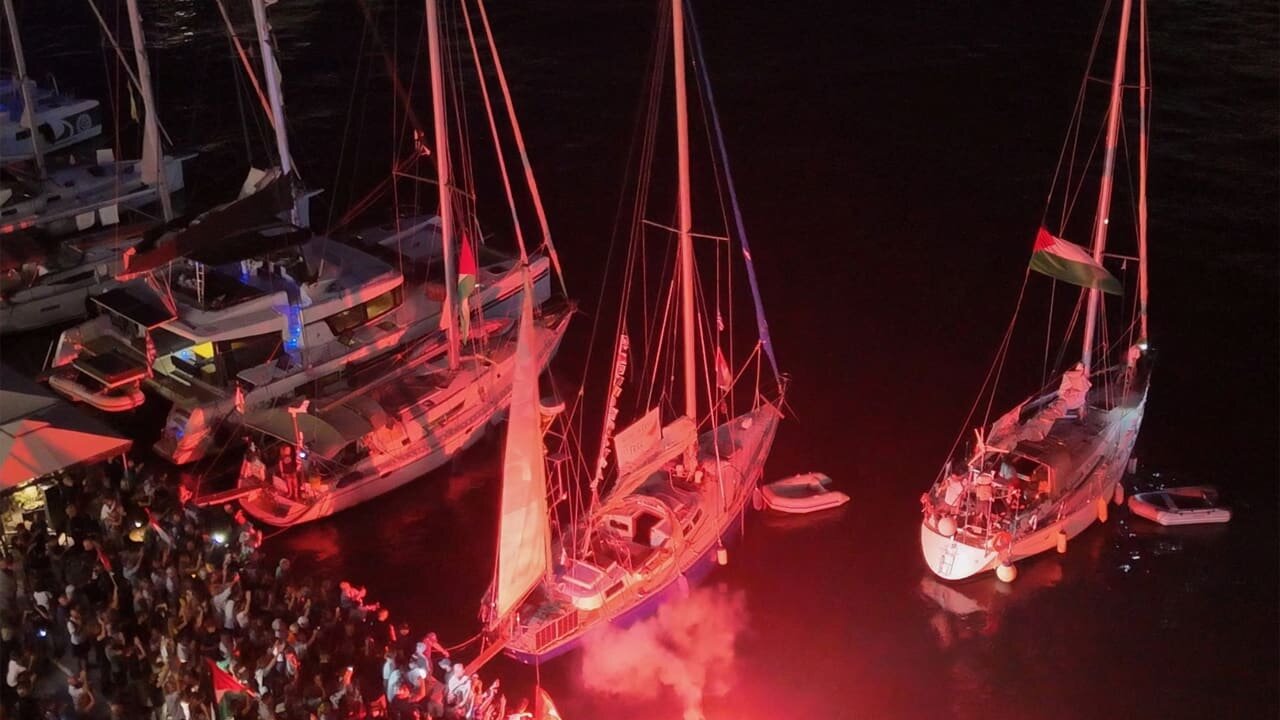Israeli drones in the dark and the flotilla the world lets bleed

TEHRAN – In the small hours of Wednesday, activists aboard the Global Sumud Flotilla reported a night of sustained aerial harassment: low-flying drones, at least 13 detonations around vessels, objects dropped on decks, and deliberate jamming of ship radios as crews dived for cover.
All this unfolded while the world’s attention was focused on the United Nations General Assembly’s annual meeting in New York City.
Video from several boats shows a drone making close passes, a bright flash, and a concussion as sailors scramble — not an accident but a pattern of strikes that left multiple vessels damaged and shaken.
Organizers and witnesses say the assaults were precise and deliberately psychological. Activists reported flashbang-style devices detonating near small sailing boats, damage to sails and rigging (the Zefiro was singled out), an unidentified chemical poured on the Yulara, and repeated VHF interference on the Alma, a logistics ship carrying legal observers and prominent passengers.
Videos and first-hand testimony captured the sound of drones, the concussive bangs, and the panic of crews seeking shelter.
This campaign follows earlier incidents that, together, suggest an escalation rather than an accident. In early September, the flotilla said one of its ships was struck by a drone in Tunisian waters; Tunisian authorities initially disputed the claim, but investigations and footage kept alive fears that extra-territorial forces were attempting to disrupt a declared humanitarian convoy.
The latest strikes occurred as the convoy transited southwest of Crete toward Gaza — a journey intended to deliver food and medical assistance to civilians in Gaza.
The legal case against these strikes is clear. The United Nations Convention on the Law of the Sea guarantees freedom of navigation on the high seas; civilian vessels in international waters cannot be attacked absent lawful justification such as self‑defense or a declared, lawful blockade.
The Fourth Geneva Convention obliges parties to permit and protect relief consignments to civilians in need (Article 59).
The San Remo Manual and customary international humanitarian law further require that any naval enforcement be declared, proportionate, and directed solely at legitimate military objectives. Indiscriminate or punitive action against humanitarian ships is inconsistent with the law of the sea and IHL.
At the level of grave criminality, the Rome Statute criminalizes intentionally directing attacks against civilians and the use of starvation of a civilian population as a method of warfare.
If non-violent, civilian Sumud vessels were targeted or rendered non-operational to prevent relief from reaching Gaza, those acts fall squarely into the kinds of conduct the international criminal framework was designed to investigate. Accountability, not obfuscation, is the legal and moral requirement.
Institutional reactions have been insufficient. The UN human rights office urged an independent investigation and accountability; the UN special rapporteur, Francesca Albanese, demanded “immediate international attention and protection.”
Italy claimed it has redirected a navy frigate to shadow the convoy and publicly warned that any operation must comply with international law and protect its nationals aboard.
Those moves are necessary—but patchwork naval escorts and statements will not deter nightly drone harassment or replace a legally enforceable mechanism to safeguard humanitarian passage.
Politically, the episode is both revealing and shameful. U.S. envoy Tom Barrack recently admitted bluntly that “Israel is attacking … Tunisia,” invoking the flotilla incidents within a wider pattern of coercion.
Whether one interprets that as candor or unintended admission, the practical effect is clear: when states or their proxies treat humanitarian missions as pressure points, the rules that protect civilians are hollowed out and the risk of impunity rises.
The Sumud flotilla is doing what many governments will not: it is putting humanitarian intent into action and bearing witness.
While delegates declaim in New York, people on these boats face the real choice between delivering aid and being effectively silenced by drones, jamming, and sabotage. The legal instruments to protect them exist; what is missing is collective political will.
The UN and states claiming fidelity to international law should move beyond denunciations: order an impartial investigation, establish protected maritime corridors for humanitarian consignments, and impose real consequences on those who weaponize the sea against civilians. Anything less is not merely diplomatic timidity — it is a moral abdication.
Leave a Comment